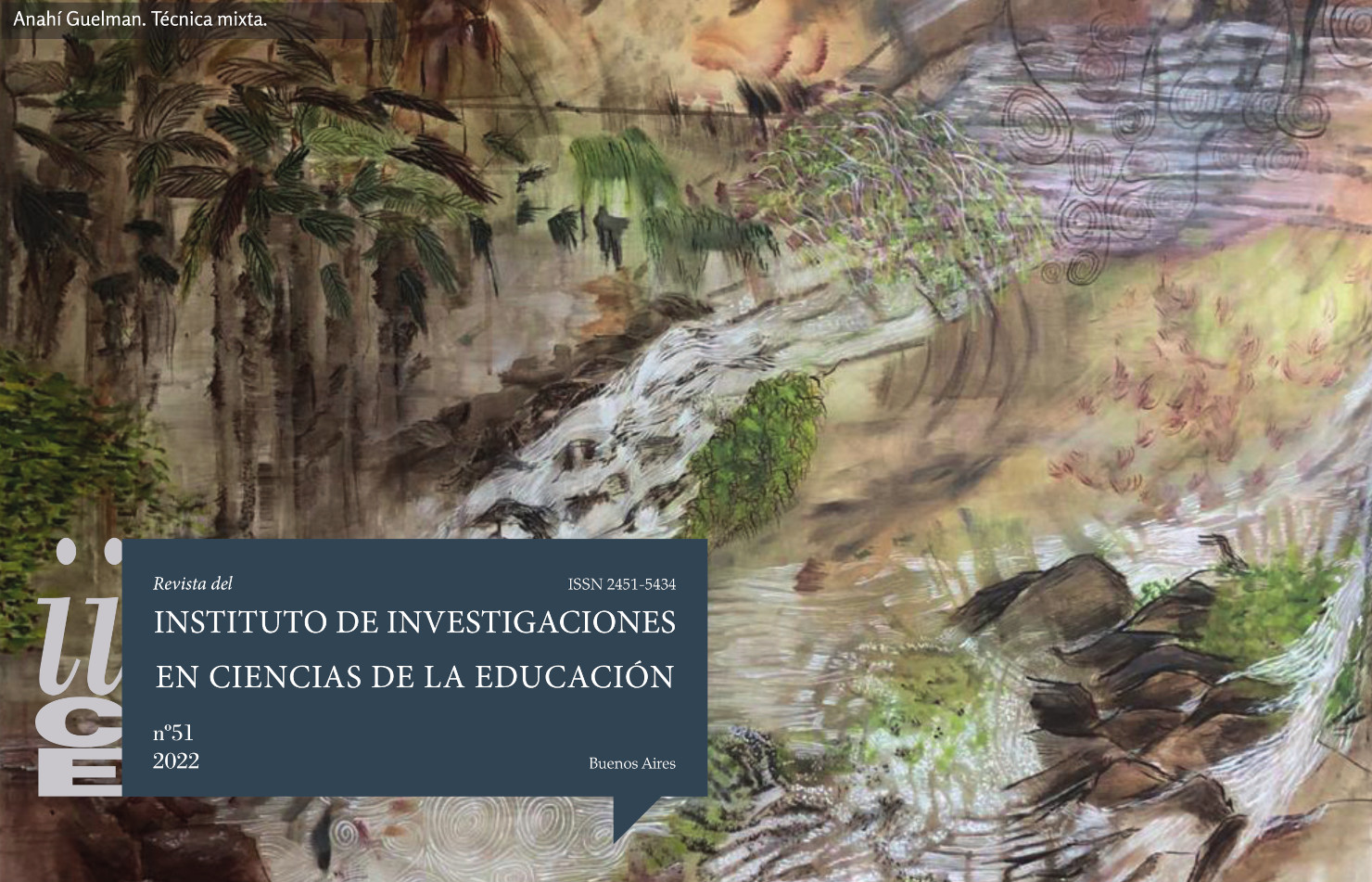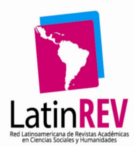The socio-emotional approach in the pandemic’s educational agenda. Between therapeutics and morals
Abstract
This paper aims at examine the political and pedagogical implications of the emotional interventions proposed by the globally structured educational agenda in the context of the pandemic caused by COVID-19. Based on the analysis of the content of documents produced between 2020 and 2021 by International Organizations –more precisely, by UNESCO, ECLAC, UNICEF and the World Bank–, we identify the consolidation of the socio-emotional approach to problems such as school dropout or learning deficits. In this context, it stands out the call to give socio-emotional support to the student body, in order to guarantee their well-being. We observe, also, an attempt to install, in the post-pandemic curriculum, content related to social emotional learning. Without underestimating the emotional and psychological impact of the pandemic caused by COVID-19, neither minimizing the role of the school in facing this experience, we want to stress that the guidelines of the International Organizations in front of the pandemic are sustained in an emotionalization and therapisation of education. At the same time, we notice a reinforcement of moral concerns not stated as such and disguised in psycho-emotional statements, which ultimately leads to an emotionalization of citizenship.Downloads
References
Abramowski, Ana (2017). Legislar los afectos. Apuntes sobre un proyecto de Ley de Educación Emocional. En Ana Abramowski y Santiago Canevaro (comp.), Pensar los afectos. Aproximaciones desde las Ciencias Sociales y las Humanidades (pp. 251-270). Los Polvorines, Argentina: Ediciones UNGS.
Abramowski, Ana y Sorondo, Juana (2021). El ingreso exitoso de la Educación Emocional en las escuelas. Una oportunidad para problematizar el discurso de la crítica en el campo educativo [Manuscrito presentado para su publicación].
Ahmed, Sara (2019). La promesa de la felicidad. Una crítica cultural al imperativo de la alegría. Buenos Aires, Argentina: Caja Negra.
Amsler, Sarah (2011). From ‘therapeutic’ to political education: the centrality of affective sensibility in critical pedagogy. Critical Studies in Education, 52(1), 47-63. 10.1080/17508487.2011.536512
Béjar, Helena (2011). Cultura psicoterapéutica y autoayuda. El código psicológico-positivo. Papers, 96(2), 341-360.
Bericat, Eduardo (2018). Excluidos de la felicidad. La estratificación social del bienestar emocional en España. Madrid, España: Centro de Investigaciones Sociológicas.
Biesta, Gert (2016). Devolver la enseñanza a la educación. Una respuesta a la desaparición del maestro. Pedagogía y Saberes, 44, 119-129.
Bisquerra, Rafael (2000). Educación emocional y bienestar. Barcelona, España: Wolters Kluwer.
Boler, Megan (1999). Feeling Power: Emotions and Education. Nueva York, EE.UU.: Routledge.
Brunila, Kristiina (2014). The rise of survival discourse in the era of therapisation and neoliberalism. Education Inquiry, 5 (1), 7-23.
Cabanas, Edgar (2019). Psiudadanos, o la construcción de individuos felices en las sociedades neoliberales. En Eva Illouz (comp.), Capitalismo, consumo y autenticidad. Las emociones como mercancía (pp. 233-263). Madrid, España: Katz.
Cabanas Díaz, Edgar y González-Lamas, Jara (2021). Felicidad y educación: déficits científicos y sesgos ideológicos de la «educación positiva». Teoría de la Educación. Revista Interuniversitaria, 33(2), 65-85. https://doi.org/10.14201/teri.25433
Carli, Sandra (2012). Niñez, pedagogía y política.Transformaciones de los discursos acerca de la infancia en la historia de la educación argentina. 1880- 1995. Buenos Aires, Argentina: Miño y Dávila.
Dale, Roger (2000). Globalization and education: Demonstrating a “Common World Educational Culture” or locating a “Globally Structured Educational Agenda”? Educational Theory, 50(4), 427-448.
Dixon, Thomas (2012). Educating the emotions from Gradgrind to Goleman. Research Papers in Education, 27 (4), 481-495.
Dubet, François (2010). Crisis de la transmisión y declive de la institución. Política y sociedad, 47(2), 15-25.
Ecclestone, Kathryn (2012). From emotional and psychological well-being to character education: challenging policy discourses of behavioral science and ‘vulnerability’. Research Papers in Education, 27 (4), 463-480.
Ecclestone, Kathryn & Brunila, Kristiina (2015). Governing emotionally vulnerable subjects and ‘therapization’ of social justice. Pedagogy, Culture & Society, 23 (4), 485-506.
Ecclestone, Kathryn & Hayes, Dennis (2009). The Dangerous Rise of Therapeutic Education. Londres, Reino Unido: Routledge.
Elias, Norbert (1993). El proceso de la civilización. Investigaciones sociogenéticas y psicogenéticas. México, México: Fondo de Cultura Económica.
Furedi, Frank (2009). Wasted. Why education isn´t educating. London, UK: Continuum
Goleman, Daniel (1996). Inteligencia emocional. Barcelona, España: Kairós.
Illouz, Eva (2014). El futuro del alma. La creación de estándares emocionales. Barcelona, Madrid: Katz/CCCB
Jódar, Francisco (2007). Alteraciones pedagógicas. Educación y políticas de la experiencia. Barcelona, España: Laertes Editorial.
Klein, Naomi (2021). La doctrina del shock. El auge del capitalismo del desastre. Barcelona, España: Editorial Planeta.
Ministerio de Educación de la Nación (2020). En las Escuelas: acompañar, cuidar, enseñar. Ciudad Autónoma de Buenos Aires, Argentina: Ministerio de Educación de la Nación.
Nobile, Mariana (2017). Sobre la “Educación Emocional”: subjetividad y psicologización en la modernidad tardía. Digithum, vol. 20, 22-33.
Prieto Egido, Miriam (2018). La psicologización de la educación: Implicaciones pedagógicas de la inteligencia emocional y la psicología positiva. Educación XX1, 21(1), 303-320. doi: 10.5944/educXX1.16058
Slaby, Jan (2019). Relational affect: perspectives from philosophy and cultural studies. En Enest van Alphen and Tomáš Jirsa (eds.) How to do things with affects (pp. 59–81). Leiden: Brill.
Sorondo, Juana (2020). Racionalidad neoliberal, educación emocional y los sentidos acerca de lo educativo. (Re)configuraciones de sentido sobre la escuela, lxs docentes y lxs estudiantes en escuelas secundarias de CABA y GBA [Tesis de maestría no publicada]. San Martín, Argentina: Universidad Nacional de San Martín.
Sorondo, Juana y Abramowski, Ana (2022). Las emociones en la Educación Sexual Integral y la Educación Emocional. Tensiones y entrecruzamientos en el marco de un ethos epocal emocionalizado. Revista de Educación, 25(1), 29-62.
Zembylas, Michalinos (2016). The therapisation of social justice as an emotional regime: implications for critical education. Journal of Professional Capital and Community, 1(4), 286-301.
Zizek, Slájov (2011). En defensa de causas perdidas. Madrid, España: Akal.
Documentos analizados
Banco Mundial (2020). Covid-19: Impacto en la educación y respuestas de política pública. Washington, EE.UU.: Grupo Banco Mundial. http://hdl.handle.net/10986/33696
Banco Mundial (2021). Actuemos ya para proteger el capital humano de nuestros niños. Washington, EE.UU.: Grupo Banco Mundial. http://hdl.handle.net/10986/35276
CEPAL-UNESCO (2020). La educación en tiempos de la pandemia de COVID-19. http://hdl.handle.net/11362/45904
Guerra, Nancy, Modecki, Kathryn y Cunningham, Wendy (2014). Developing Social-Emotional Skills for the Labor Market: The PRACTICE Model. Washington, EE.UU.: World Bank Group. https://openknowledge.worldbank.org/handle/10986/20643
OCDE (2016). Habilidades para el progreso social. El poder de las habilidades sociales y emocionales. Paris, Francia: UNESCO Institute for Statistics. https://doi.org/10.1787/9789264253292-es.
OCDE (2018). Social and Emotional Skills for Student Success and Well-being: Conceptual Framework for the OECD Study on Social and Emotional Skills. Paris, Francia: OECD. https://doi.org/10.1787/19939019
UNESCO (2020a). Reunión Global sobre la Educación 2020. Sesión extraordinaria de la educación post-COVID-19. Documento de referencia. https://en.unesco.org/sites/default/files/2020_gem_background_paper_es.pdf
UNESCO (2020b). Promoción del bienestar socioemocional de los niños y los jóvenes durante la crisis. https://unesdoc.unesco.org/ark:/48223/pf0000373271_spa?fbclid=IwAR1BBi6CoRKalki-Yi2IpussZMMzzRtHZvIdsyXyPI4D2P92-IKjLWfyOTQ
UNESCO, BM y UNICEF (2021). Misión: Recuperar la educación en 2021. https://www.unicef.org/media/98876/file/Mission%20:%20Recovering%20Education%20in%202021.pdf











